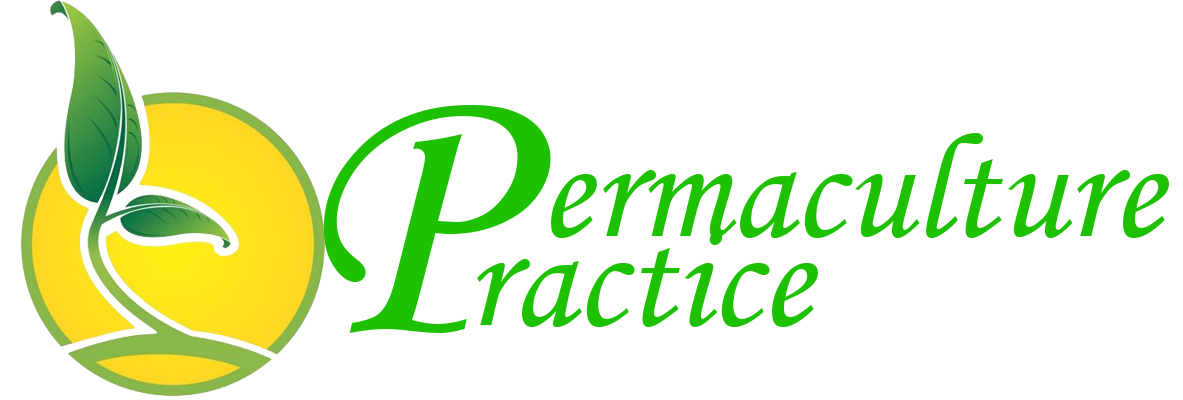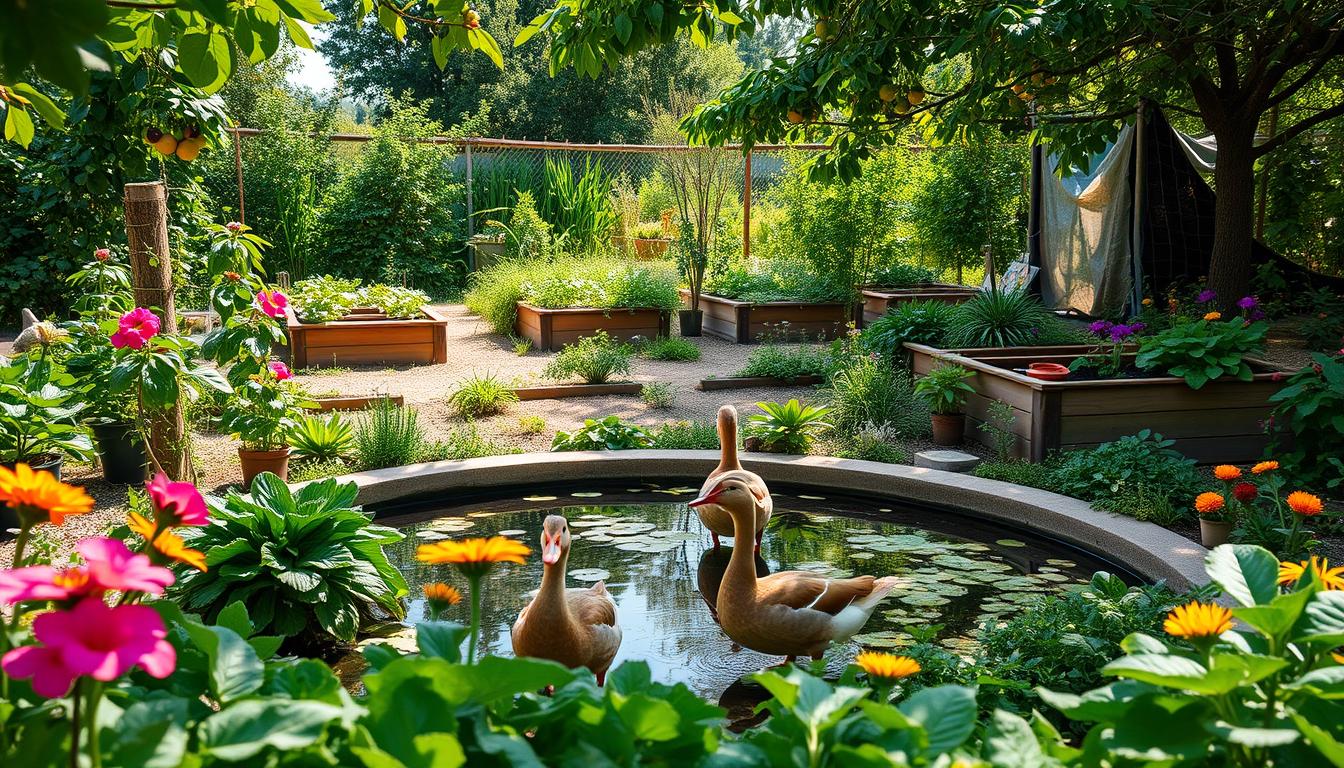Did you know that ducks can effectively eliminate pests like slugs, snails, and insects from your fields within just 1-2 weeks? That’s the surprising finding from studies on the remarkable pest control capabilities of these feathered wonders. Ducks are not only natural pest-busters but also play a vital role in permaculture systems, helping to manage weeds, improve soil fertility, and boost overall crop yields.
Integrating ducks into your permaculture design creates a sustainable, closed-loop system that reduces the need for synthetic pesticides and herbicides, promoting biodiversity and environmental health. These adaptable waterfowl thrive on a diverse diet of water plants, grains, and a variety of pests, making them the perfect addition to any regenerative farming operation.
Whether you’re a seasoned permaculture enthusiast or just starting to explore sustainable agriculture, incorporating ducks into your land management strategy can pay dividends in terms of natural pest control, nutrient cycling, and improved ecosystem resilience. Discover the multifaceted benefits of Ducks in Permaculture and unlock the power of this dynamic, low-impact livestock for your holistic land management approach.
Ducks: Nature’s Pest Control Warriors
Ducks are more than just charming additions to any garden or farm; they are natural pest control warriors. With their insatiable appetite for slugs, snails, and a variety of insects, ducks can be highly effective in managing infestations without the need for harmful chemicals. Their duck foraging behavior makes them true masters of organic weed and pest management.
Slugs, Snails, and Bugs: A Banquet for Ducks
Ducks have a natural affinity for consuming a wide range of pests, including slugs, snails, and various insects. They actively forage for these prey items, making them highly effective at controlling infestations without the use of synthetic pesticides. Ducks’ eagerness to consume weed seeds also helps reduce the presence of unwanted plants, contributing to an organic and sustainable approach to integrated pest management in permaculture poultry systems.
By incorporating ducks into their closed-loop systems, farmers can minimize the need for harmful chemicals, which can have detrimental effects on the environment and ecosystem. This holistic approach to natural pest control and organic weed management is a hallmark of permaculture principles.
“Insect populations are reported to be plummeting, which can affect the overall survival of humanity due to farming practices and chemical pesticide use.”
Ducks’ versatility in pest control is further highlighted by their ability to consume a variety of insects, from aphids to grasshoppers. Their foraging behavior ensures a balanced ecosystem, where they coexist harmoniously with beneficial insects like ladybugs and lacewings, which also contribute to natural pest control.
The Rice-Duck Farming System
The rice-duck farming system, widely practiced in Asian countries like China and Vietnam, showcases the effectiveness of integrating ducks into agricultural production. In this symbiotic relationship, ducks are introduced to rice fields during the early stages of rice growth, where they effectively control pests and weeds. Studies have demonstrated that the presence of ducks can lead to a significant decrease or even complete elimination of pests within 1-2 weeks, while also reducing weed growth.
A Proven Sustainable Symbiosis
The rice-duck farming system represents a proven sustainable symbiosis, where the ducks benefit from the abundant food sources in the fields, and the crops benefit from the ducks’ pest and weed control, as well as the added nutrients from their manure. More than 10,000 Japanese rice farmers have successfully incorporated and sustained this integrated crop-livestock system on their farms, increasing their yields by 20 to 50% in the first year.
“By implementing the rice-duck farming system from ‘The Power of Duck,’ farmers have increased their yields by 20 to 50% in the first year.”
The Aigamo rice-duck farming method has been used in Japanese farming for over 500 years, and Takao Furuno, a pioneer of this system, has shared his method with farmers in areas such as China, India, and the Philippines, as well as with more than 10,000 Japanese farmers. Furuno’s farm produces 7 tons of rice, 4,300 ducks, and a sufficient amount of vegetables and fish to sustain 100 families per week, with rice yields almost twice those of chemically induced farms.
The rice-duck farming system is a testament to the power of integrated crop-livestock systems and permaculture principles in achieving sustainable agriculture. By harnessing the natural symbiosis between ducks and rice fields, farmers can reduce their reliance on synthetic inputs, improve soil health, and enhance the overall resilience of their agricultural systems.
Environmental Benefits of Ducks in Permaculture
Integrating ducks into permaculture systems offers numerous environmental benefits. By providing natural pest and weed control, ducks reduce the need for synthetic pesticides and herbicides, which can harm beneficial insects, pollute water sources, and disrupt fragile ecosystems. Ducks also contribute to a closed-loop system, as their nutrient-rich manure can be used to fertilize crops, promoting soil health and fertility.
Moreover, the presence of ducks in permaculture enhances biodiversity by supporting a range of wildlife and invertebrates that thrive in a balanced and diverse ecological environment. Ducks spend a tenth of their time in water, and 3-5 ducks can be included in a garden setup without extensive expertise. Their unique feeding habits, such as dabbling in muddy water, effectively control pests like slugs while leaving established vegetables unharmed.
“Ducks are effective at controlling slugs, which they consume eagerly.”
However, it is important to manage the ducks’ impact on the land by rotating them onto new areas and providing designated dabbling spaces to prevent erosion. By incorporating ducks into holistic land management practices, permaculture enthusiasts can achieve environmental sustainability and reduced chemical inputs, further contributing to the overall health and resilience of their closed-loop systems.
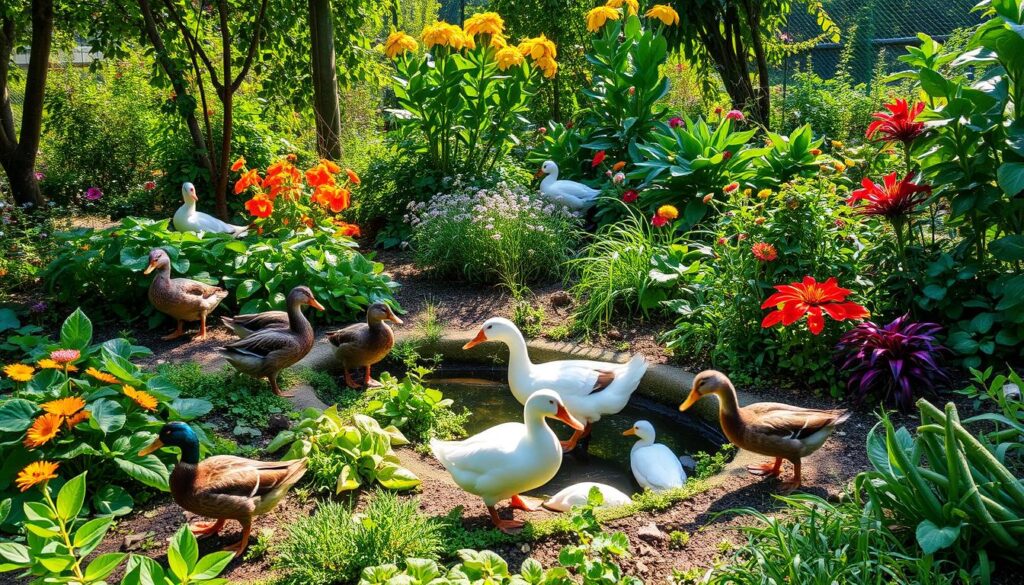
Ducks in Permaculture: Natural Pest Control and More
Ducks play a versatile and essential role in permaculture systems, offering much more than just natural pest control. By consuming a wide range of pests and weeds, ducks help maintain the ecological balance in permaculture gardens and farms. For instance, Indian Runner ducks at a wine farm in South Africa are employed as natural pest control, with around two thousand ducks utilized for this purpose. Each Indian Runner duck can consume up to two hundred locusts daily, as demonstrated during a locust plague in China.
In addition to their pest control prowess, ducks can also contribute to a closed-loop system in permaculture. Their nutrient-rich manure can be used to fertilize the soil, promoting long-term soil health and fertility. Ducks produce more manure compared to chickens, and their manure is high in potassium, phosphorous, and nitrogen. This can be turned into natural compost by trampling it into straw or wood chips, creating a valuable resource for crops and plants.
The integration of ducks into permaculture aligns with the principles of holistic land management, where multiple species work in multi-species synergy to create a thriving, sustainable agriculture ecosystem. Ducks are hardy, disease-resistant, and can tolerate colder temperatures better than chickens, making them well-suited for closed-loop systems and ducks in permaculture.
“Ducks are nature’s pest control warriors, consuming a wide range of pests and weeds to maintain the ecological balance in permaculture gardens and farms.”
Socioeconomic Advantages of Duck Integrated Farming
Integrating ducks into farming systems can provide significant socioeconomic benefits for farmers and communities. Studies have shown that the duck-rice farming system can lead to reduced production costs, as the need for synthetic inputs is minimized. Additionally, the introduction of ducks can result in increased yields, with some reports indicating up to a 20% boost in rice production.
The versatility of ducks, providing both pest control and a source of protein through their eggs and meat, can also enhance food security and increase household incomes, contributing to the overall economic and social well-being of farming communities. By integrating ducks into their operations, farmers can capitalize on the natural synergies between ducks and crops, leading to more sustainable and profitable farming practices.
“Integrating ducks into farming systems can provide significant socioeconomic benefits for farmers and communities.”
The duck-rice farming system is a prime example of how duck integrated farming can drive enhanced food security and income generation for smallholder farmers. By leveraging the natural pest control capabilities of ducks and the additional income from duck products, farmers can reduce their reliance on costly chemical inputs, leading to higher profits and improved livelihoods.
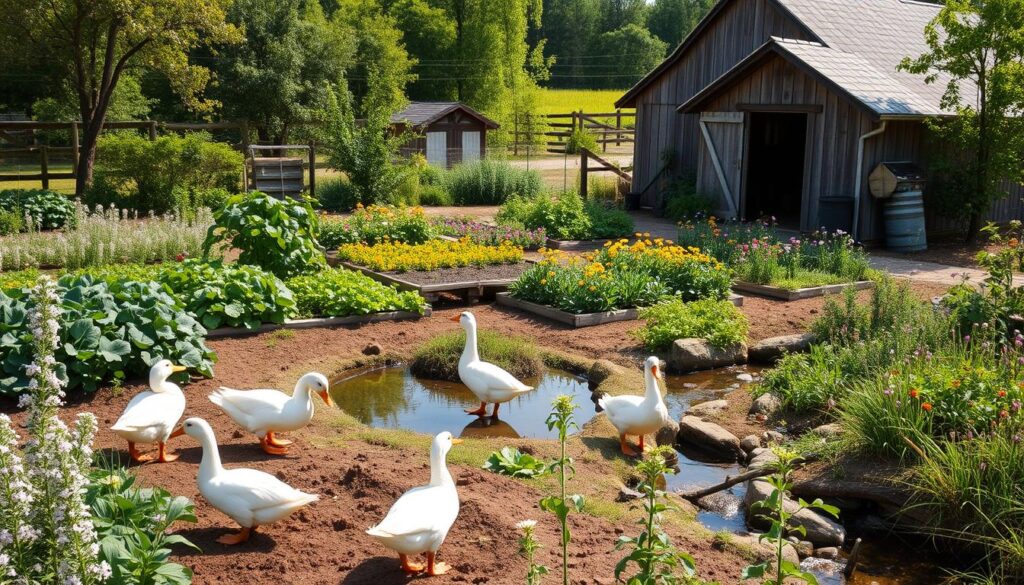
The adoption of duck integrated farming practices not only benefits individual farmers but also contributes to the overall socioeconomic development of rural communities. By enhancing agricultural productivity, improving food security, and generating additional income streams, this integrated farming approach can play a crucial role in addressing social and economic challenges faced by smallholder farmers and their families.
Breed Selection for Pest Control
When it comes to using ducks for natural pest control in permaculture, certain breeds stand out for their exceptional foraging abilities and appetite for slugs, snails, and various insects. Two of the top choices are the Indian Runner and Khaki Campbell ducks.
The Indian Runner ducks are renowned for their strong foraging instincts, making them highly efficient at controlling pests in the fields. These tall, upright ducks are natural hunters, continuously on the move and actively seeking out slugs, snails, and other garden invaders.
Indian Runners and Khaki Campbells: Top Choices
The Khaki Campbell ducks are also highly effective at pest management, thanks to their foraging behavior and prolific egg-laying abilities. These ducks are known for their hardy nature and ability to thrive in diverse environments, making them an excellent choice for permaculture gardens.
When selecting duck breeds for your pest control needs, considering the characteristics and foraging behaviors of Indian Runners and Khaki Campbells can help you choose the most suitable options for your permaculture setup. These breeds are natural allies in the fight against garden pests, transforming them into a valuable resource for your sustainable ecosystem.
Training Ducks for Pest Control
Ducks can be trained to become efficient pest control agents in permaculture systems. By using positive reinforcement techniques, such as providing treats (e.g., slugs and snails) when ducks display the desired pest control behavior, farmers can encourage and reinforce this behavior. Additionally, associating a distinctive sound or call with the treat can help ducks learn to recognize the cue and respond accordingly.
Actively engaging the ducks in the pest control process, such as by taking them into the garden and showing them where to find the pests, can further enhance their effectiveness in managing slugs, snails, and other harmful insects. This duck-human communication and foraging habits training helps ducks become valuable assets in the permaculture system, providing natural and sustainable pest control without the use of harmful chemicals.
“A flock of five runner ducks is reported to effectively cover over an acre of garden and orchards.”
Certain duck breeds, like the Khaki Campbell and Indian Runner, are particularly well-suited for pest control due to their efficient foraging habits. By incorporating positive reinforcement techniques into the duck training process, farmers can harness the natural behaviors of these ducks to create a sustainable and eco-friendly solution to pest management.
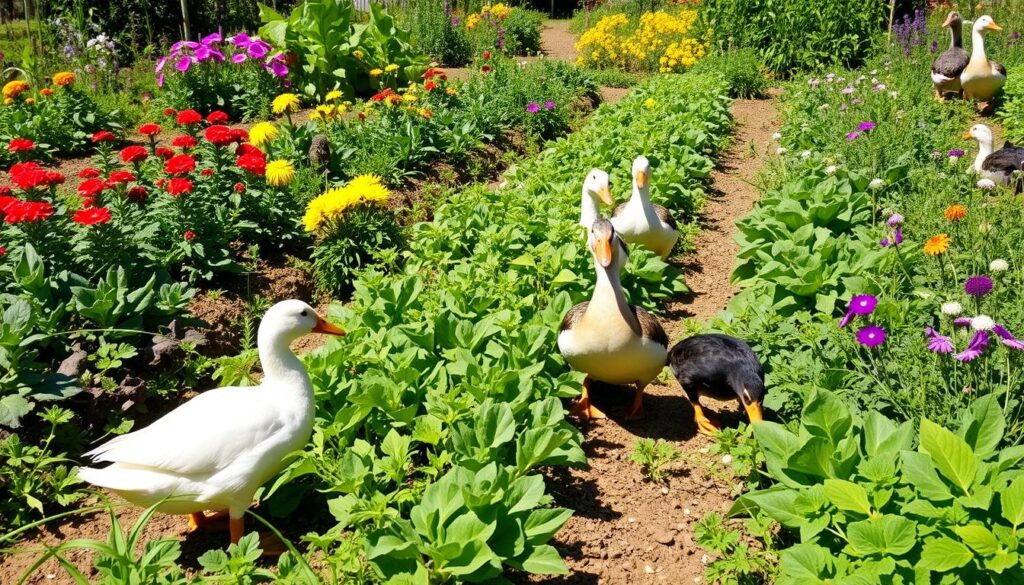
Consistent training, where ducks are rewarded for tasks such as hunting bugs in the garden and tolerating being handled, is essential for developing their pest control behavior. With the right approach, ducks can become valuable partners in the permaculture system, contributing to the overall health and productivity of the land.
Ducks vs. Chickens: The Great Pest Control Debate
When it comes to natural pest control in permaculture systems, the debate between ducks and chickens is an intriguing one. While both feathered friends can contribute to managing pests, ducks prove to be the more efficient and effective option for the job.
Ducks, with their strong foraging instincts, excel at hunting down and consuming slugs, snails, and a variety of insects. Their natural appetite for these common garden pests makes them a valuable asset in protecting vulnerable vegetable plants. In contrast, chickens may quickly lose interest in hunting slugs and snails, and can even cause damage to delicate crops through their scratching and digging habits.
Moreover, ducks are better suited for damp environments where many pests thrive. Their tolerance for wet conditions allows them to forage effectively in areas that chickens may avoid. This makes ducks the preferred choice for permaculture enthusiasts seeking a natural and efficient pest control solution.
“Ducks are the unsung heroes of the permaculture world, providing superior pest control and environmental benefits that make them a standout choice for sustainable farming.”
The distinct advantages of ducks in pest management, coupled with their overall compatibility with permaculture principles, cement their role as the champions in the great ducks vs. chickens debate. Permaculture practitioners who embrace the power of ducks can look forward to healthier, more resilient gardens and a more harmonious, nature-based approach to agriculture.
Ducks as Sustainable Livestock
When it comes to sustainable livestock in permaculture systems, ducks stand out as an excellent choice. Compared to other poultry, ducks are generally hardier, more disease-resistant, and better able to withstand extreme temperatures, whether hot or cold. Their waterproof feathers and natural insulation provide them with protection from the elements, allowing them to thrive in a variety of climates.
Hardier, Healthier, and Disease-Resistant
Ducks require less maintenance than chickens, as they are less prone to parasites and other health issues. This makes them a resilient and low-impact addition to permaculture farms, contributing to the overall sustainability and self-sufficiency of the system. In fact, studies have shown that ducks, including Muscovy ducks, are efficient at reducing mosquito populations, providing natural pest control in the surrounding environment.
Additionally, ducks are adaptable foragers, able to meet a significant portion of their dietary needs by grazing on grasses and insects. This can lead to reduced feed costs compared to other livestock, further enhancing the sustainability of duck-integrated farming systems.
“Ducks are well-suited as sustainable livestock in permaculture systems, contributing to the overall sustainability and self-sufficiency of the farm.”
As the demand for sustainable, locally-sourced food grows, the integration of ducks into permaculture farms is becoming an increasingly attractive option. With their hardiness, disease resistance, and low-maintenance requirements, ducks provide a resilient and environmentally-friendly addition to the diverse array of livestock and crops found in these regenerative agricultural systems.
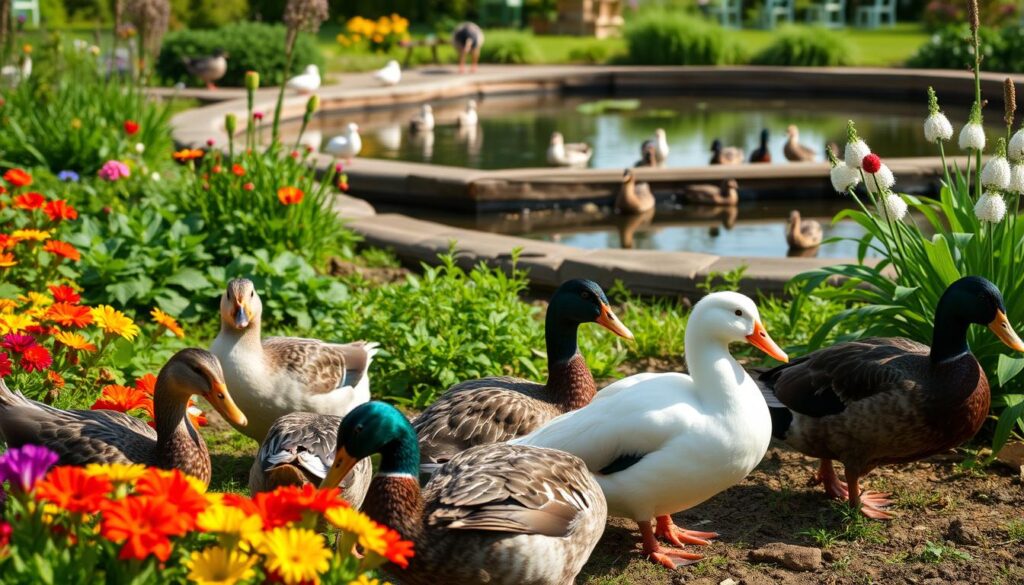
Duck Housing and Care
Ducks are a wonderful addition to any permaculture system, thanks to their hardy nature and low-maintenance housing requirements. Unlike chickens, ducks do not need elaborate coops or perches; they are content to roost on the ground or on sturdy logs or stumps. A well-ventilated duck house with a deep litter of straw or other organic materials can provide ample shelter and insulation, especially in colder climates.
Simple Shelters for Hardy Waterfowl
Ensuring the duck house has a secure door to protect the ducks from predators at night is essential. With their hardy nature and low-maintenance needs, ducks can be easily integrated into permaculture systems with minimal effort. A simple, well-ventilated shelter is all that’s needed to keep your ducks safe and comfortable.
When it comes to duck care, the key is providing a secure, insulated space that protects them from the elements and predators. With their natural adaptability, ducks make an excellent choice for permaculture enthusiasts seeking a low-maintenance, yet highly beneficial, addition to their systems.
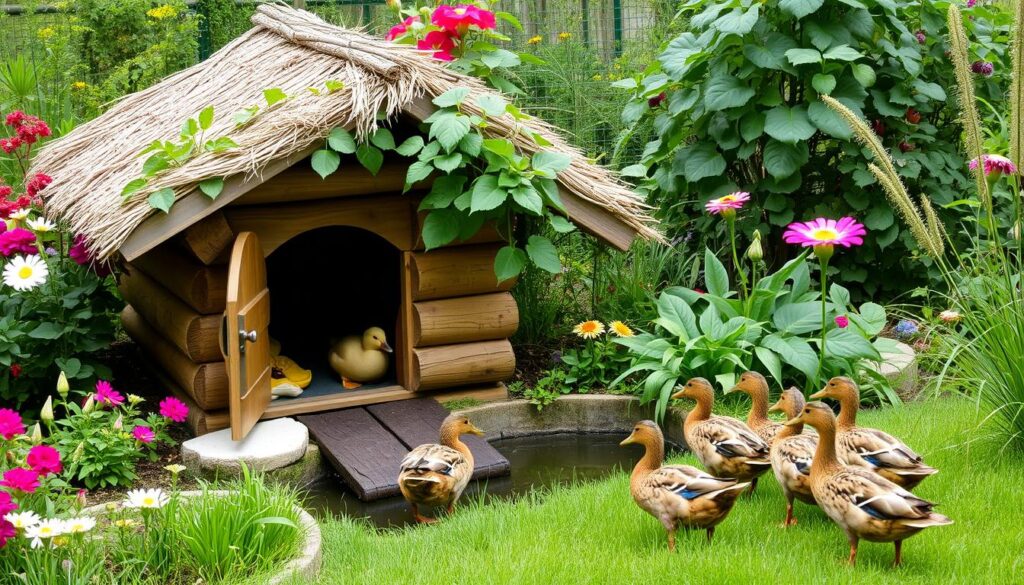
“Ducks are described as incredibly pleasant animals to be around, displaying gentle and curious behavior, along with intense flocking behavior.”
Duck Eggs: A Nutritious and Delicious Bonus
In addition to their pest control and manure production benefits, ducks in permaculture also provide a valuable source of highly nutritious duck eggs. Duck eggs are larger than chicken eggs, with a richer, creamier yolk that is higher in vitamins and minerals, including iron, folate, and vitamin B12. Many people find that duck eggs produce fluffier baked goods and have a more pronounced, yet delicious, flavor.
Egg-laying duck breeds, such as the Indian Runner and Khaki Campbell, can lay up to 360 eggs per year, making them a reliable and abundant source of protein for permaculture households. Runner Ducks typically produce around 250 to 300 eggs through a year, while Khaki Campbells lay around 250 to 340 off-white eggs annually. These duck eggs not only boast impressive egg-laying productivity, but they also offer a range of nutritional benefits and cooking properties that make them a highly sought-after addition to any permaculture system.
“Duck eggs are larger than chicken eggs, with a richer, creamier yolk that is higher in vitamins and minerals.”
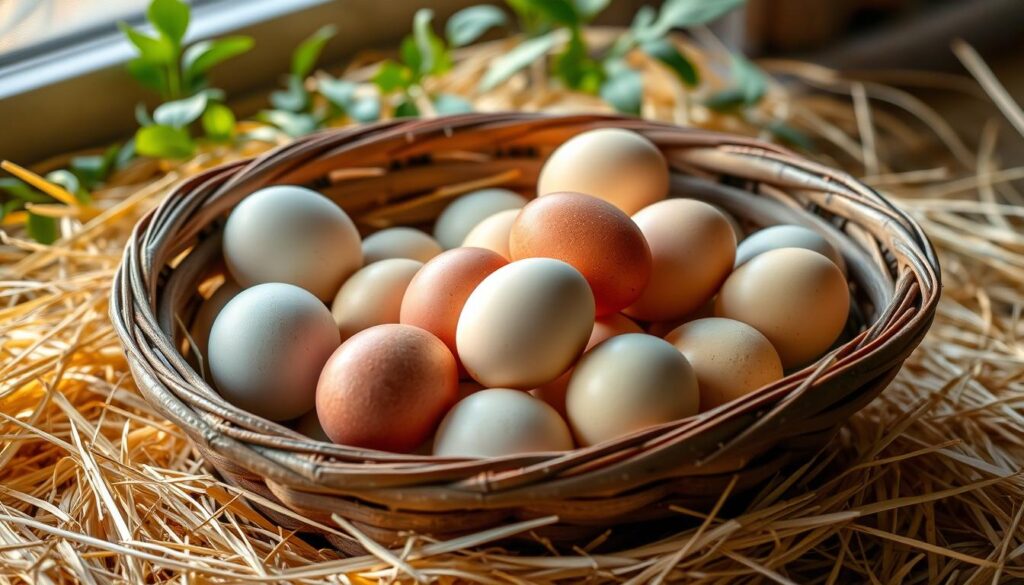
Whether you’re looking to bake up delectable treats or simply enjoy a nutritious breakfast, duck eggs are a fantastic choice for permaculture enthusiasts. Their versatility and abundance make them a valuable asset in any sustainable food production system.
Duck Manure: A Natural Fertilizer Powerhouse
In the realm of permaculture, duck manure stands out as a true natural fertilizer powerhouse. This nutrient-dense byproduct of duck farming is a valuable asset for any sustainable garden or farm. Rich in essential plant nutrients like nitrogen, phosphorus, and potassium, duck manure provides a bountiful boost to soil fertility and plant growth.
When composted alongside organic materials such as straw, wood chips, or dried leaves, duck manure transforms into a nutrient-rich compost that can be evenly distributed throughout the permaculture landscape. This compost not only enhances soil structure but also helps retain moisture and suppress weed growth, contributing to the overall health and productivity of the garden.
But the benefits of duck manure don’t stop there. Its liquid-heavy nature also makes it an excellent choice for fertigation – the direct application of nutrient-rich water to crops. This method of delivering essential nutrients directly to the plants’ roots can result in remarkable growth and yield improvements, further enhancing the sustainability of the permaculture system.
“Duck manure is a gift that keeps on giving – it nourishes the soil, supports plant growth, and helps create a thriving, resilient permaculture ecosystem.”
Whether used as a natural fertilizer, composted into a soil-enriching amendment, or applied through fertigation, duck manure is a true powerhouse in the world of permaculture. By harnessing the power of this renewable resource, gardeners and farmers can unlock the full potential of their land and create bountiful, sustainable harvests.
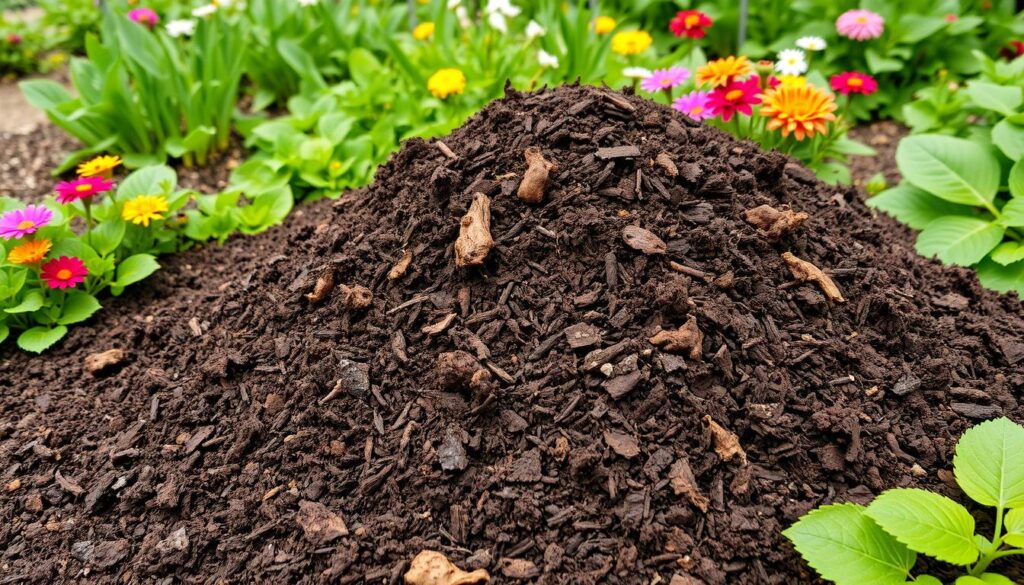
Conclusion
Integrating ducks into permaculture systems offers a multitude of benefits that align with the principles of sustainable and regenerative agriculture. Ducks serve as highly effective natural pest control agents, consuming a wide range of slugs, snails, and insects that can harm crops. Their manure also provides a nutrient-rich fertilizer that can be used to enhance soil fertility and promote healthy plant growth.
By creating a closed-loop system where the ducks’ foraging and waste contribute to the overall productivity of the permaculture ecosystem, farmers and gardeners can reduce their reliance on synthetic inputs and foster a more holistic, self-sustaining approach to land management. The versatility of duck breeds, from the prolific egg-laying Indian Runners and Khaki Campbells to the meat-focused Appleyards and Muscovies, allows for customized integration to meet the specific needs of each permaculture system.
Ultimately, the integration of ducks in permaculture offers a sustainable and nature-based solution to pest control, nutrient cycling, and overall system resilience. As we strive to transition towards more ecological and regenerative approaches to agriculture, the role of ducks as natural allies cannot be overstated. By embracing the synergies between ducks and permaculture, we can create thriving, self-sustaining ecosystems that benefit both people and the planet.
